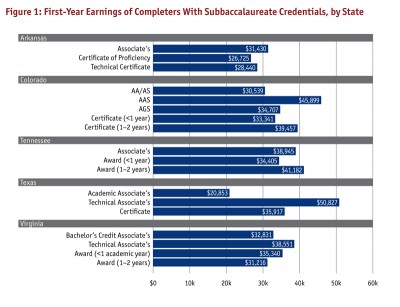Elite degrees don’t necessarily earn more, study finds
Graduates of elite colleges and universities don’t necessarily make more money than their counterparts at less well-known schools, according to new research.
Using the first-year earnings of graduates of colleges and universities in five states, the study found that those from regional and second-tier campuses, on average, earn about the same as those who go to prestigious flagship universities.
It also confirms that students with associate’s degrees often out-earn bachelor’s degree-holders, and that some new graduates in science fields including biology or chemistry don’t make much more than English language or literature majors.
“The findings challenge some conventional wisdom, showing, for example, that what you study matters more than where you study,” said Mark Schneider of theAmerican Institutes for Research, which issued the report.
The study looked at first-year earnings of graduates in Arkansas, Colorado, Tennessee, Texas and

Rick Miller, executive director of the California Office to Reform Education. Credit: The Hechinger Report
Dozens of states have been granted waivers from No Child Left Behind since 2011, when the Obama administration adopted a more flexible approach to the Bush-era act. When the Department of Education denied California’s waiver application in December 2012, a consortium of eight districts pushed for autonomy from the state. Dubbed CORE, the California Office to Reform Education, the districts developed their own set of strategies, emphasizing shared accountability and a holistic approach to student evaluation.
Earlier this month, U.S. Secretary of Education Arne Duncan granted CORE a waiver from certain aspects of No Child Left Behind, the first waiver for districts rather than a state. CORE districts now have the flexibility to spend approximately $110 million in Title I funding as they see fit. CORE Executive Director Rick Miller took inspiration from Michael Fullan, the mastermind behind world-renowned schools in Ontario, whose significant population of English language learners resembles California’s. The Hechinger Report talked to Miller about what the waiver will mean for the nearly 1.2 million students in CORE districts, including Fresno Unified, Long Beach Unified, Los Angeles Unified, Oakland Unified, Sacramento City Unified, San Francisco Unified, Sanger Unified,

